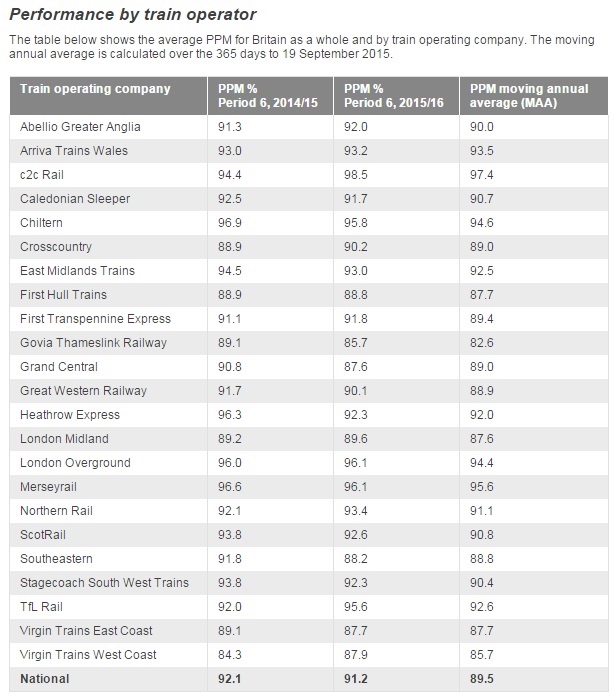20.10.15
National rail performance continues to recover in period 6
National performance has improved marginally over the past month, with the PPM figure rising to 91.2%.
The overall figure, which covers performance for 23 August to 19 September, is up from the 90.3% recorded during the previous period.
But despite steadily increasing since the last two periods, the latest figure is still down on the 92.1% recorded in period 6 last year.
In terms of each train operator, perhaps the most remarkable recovery was by the Caledonian Sleeper, whose performance had dropped dramatically last period after beginning to trend upward under Serco in period 4. The operator’s latest PPM figure for period 6 is 91.7% – a significant increase from 85.1% in the previous period, and just slightly lower than 92.5% in the same period last year, when it was a part of ScotRail.
Govia Thameslink Railway (GTR) also began to recover after being the worst performing operator in period 5, during which it recorded a PPM figure of 84.1%. This has raised to 85.7% in period 6, which, albeit just a marginal increase, could indicate the start of its recuperation after taking in Southern, Gatwick Express and some Southeastern services in late July – when it became the largest single UK franchise.
And its sub-operator, Gatwick Express, improved accordingly: in period 5, it was the only operator with a PPM figure below 80% across the rail network. It has now recovered back up to 80.8%.
TfL Rail’s PPM also improved considerably, lifting from 92% in period 6 last year (when its routes were operated by Abellio Greater Anglia) to 95.6% in the same period this year. But this still represents a downward trend from its PPM figure (96.9%) in period 5.
TfL Rail took over the London Liverpool Street to Shenfield metro services from Abellio on 31 May.
Great Western Railway, the new branding for First Great Western, recorded a PPM figure of 90.1%, slightly below last year’s performance (91.7%) in the same period. This figure recording cut off just before the operator launched its revamped brand featuring upgraded timetables and fleet livery in order to drive improvement.
 Click on the image to enlarge it.
Click on the image to enlarge it.
Once again, c2c was the best performing operator in period 6, recording a near-perfect PPM figure of 98.5% – higher than both the same period last year and period 5 of this year. It is also the only operator with less than 1% of cancellations and significant lateness.
Its managing director, Julian Drury, said the operator hopes to extend its reputation for reliability by delivering new improvements, such as the c2c smartcard.
On the other end of the scale, Virgin Trains East Coast recorded the highest amount (5.6%) of cancellations and lateness. It was also amongst the most delayed operators during the last period, but had been topped by First Hull Trains’ particularly negative cancellation figure of 8.6%.
First Hull Trains has now recovered significantly, bringing this figure down to 4.7%.
These cancellations are recorded if a train is cancelled at origin or en route, if its originating station is changed, if it fails to make a scheduled stop or if it is more than 30 minutes late.
These delays are usually mostly attributable to Network Rail, who was once again responsible for 59% of train delays of three minutes or more due to infrastructure, operations or external issues.